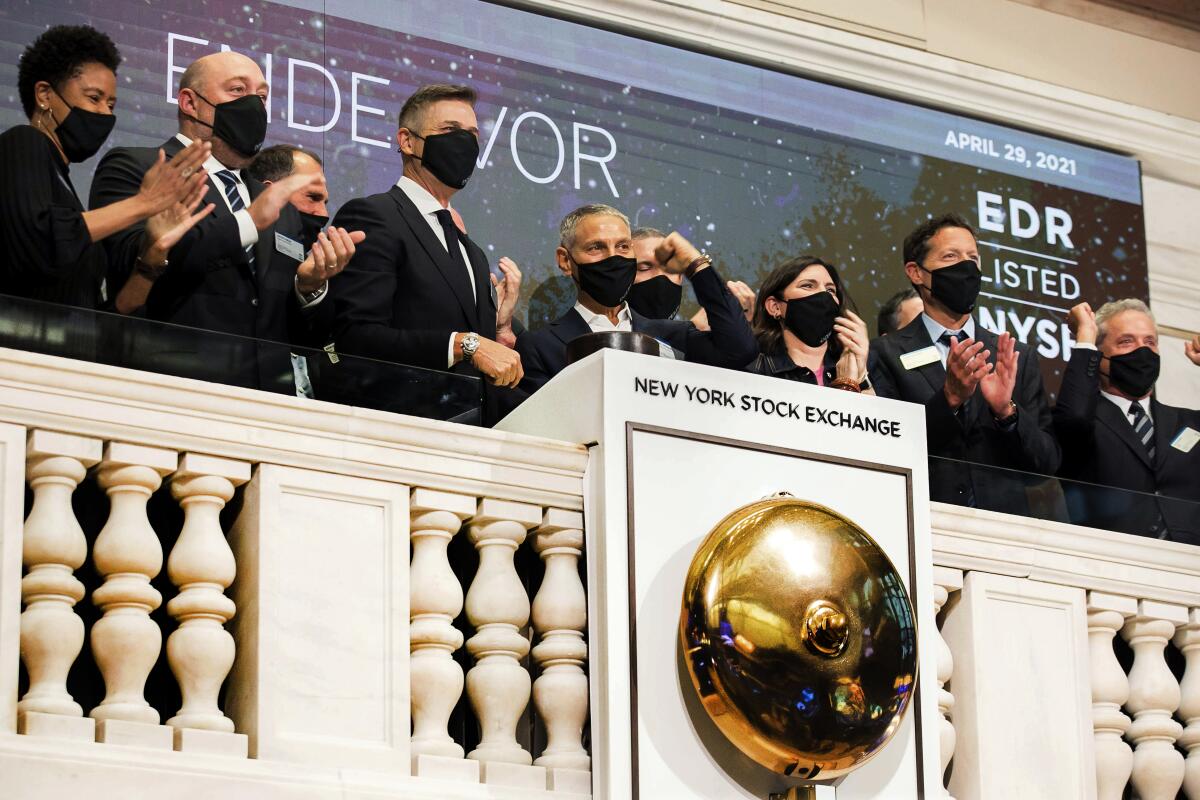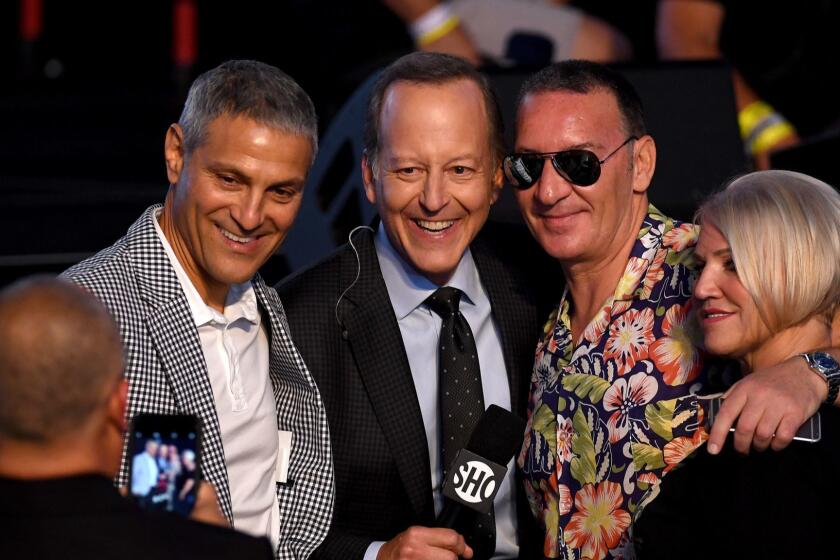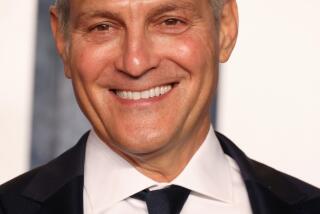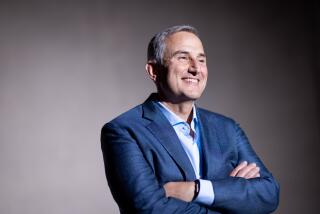Ari Emanuel finally took Endeavor public. Now what?

Endeavor Group Holdings, the owner of the Ultimate Fighting Championship and the largest Hollywood talent agency, has finally entered the arena as a publicly traded company.
Shares of the Beverly Hills-based firm on Thursday began trading on the New York Stock Exchange under the symbol EDR, as the company bets big on live sports and entertainment making a massive resurgence as the COVID-19 pandemic wanes.
Superagent Ari Emanuel, Endeavor’s chief executive, rang the bell to commemorate the company’s stock market debut with Executive Chairman Patrick Whitesell and other executives.
The company on Wednesday priced its shares at $24, at the top of its projected range, to raise $511 million from Wall Street. The initial public offering values Endeavor at about $10 billion. The firm also secured deals to raise $1.8 billion through a private placement and, in a key move, acquire the 49.9% of UFC that it didn’t already own.
The stock closed Thursday at $25.20, up 5% from its $24 issuing price. Shares opened at $27 and sank below the offering price to $23.25 before recovering, according to FactSet.
Inside the business of entertainment
The Wide Shot brings you news, analysis and insights on everything from streaming wars to production — and what it all means for the future.
You may occasionally receive promotional content from the Los Angeles Times.
Endeavor’s public rollout sets the stage for Emanuel’s potential comeback after a harrowing year and a half. The company planned to go public in 2019 but postponed the effort the day before the shares were supposed to begin trading, thanks to choppy market conditions and tepid investor interest.
Since then, the company has endured the massive challenges of the pandemic, which shuttered film and TV productions, delayed live sporting events, canceled Broadway shows and shuttered concert venues.
The company’s revenue fell 24% to $3.47 billion in 2020, with a net loss of $625.3 million, according to its recent regulatory filings. The company cut salaries and had layoffs during the coronavirus crisis.
Endeavor President Mark Shapiro on Thursday said the company is well positioned to benefit from the pandemic recovery after a year that hammered entertainment businesses.
Endeavor should fare especially well from the demand for live sports after the consolidation of UFC within the company, he said. Meanwhile, Endeavor’s talent representation side should take advantage of the growth in demand for content among media companies looking to funnel shows and movies to streaming services.
“We’re uniquely positioned, especially coming out of pandemic,” Shapiro said in an interview. “Consumers and audiences are flocking to premium content and brands and celebrities they know they trust and love.... As much as we were the bull’s-eye for the pandemic, we’re now, I think, the bellwether for the boom that’s about to be had.”
Founded in 1995, Endeavor has transformed itself over the years into a sports and entertainment conglomerate, with celebrity clients including Dwayne Johnson, Oprah Winfrey and Mark Wahlberg, as well as production company Endeavor Content and sports agency IMG. In November 2019 the Beverly Hills firm acquired the speaking-engagement firm Harry Walker Agency. In January 2020 it snapped up On Location Experiences, an events business started by the National Football League, for $600 million.
But its biggest bet is on UFC, the mixed martial arts circuit known for over-the-top athletes such as Conor McGregor. Endeavor in 2016, then called WME/IMG, led a group of investors in a $4-billion deal to take over the popular combat sports league, giving the talent agency a controlling stake. With full ownership, the league is set to become a cornerstone of Endeavor’s business.
“The single biggest issue investors had the first time they tried to do this was that their biggest, most important business — they only owned half of,” said media analyst Richard Greenfield, a partner at research firm LightShed Partners. “Now they are in the process of consolidating UFC and so you really have an operating business of UFC and representation, which they did not have before.”
Endeavor-owned sports businesses, including UFC, Professional Bull Riders and Euroleague basketball, accounted for 27% of the company’s revenue in 2020, and 78% of its earnings before factors including interest and taxes. UFC, led by its hard-charging president, Dana White, was among the first sports leagues to begin holding live events during the pandemic, setting up its Fight Island series of bouts in Abu Dhabi last summer.
The league recently held its first full-capacity event since the pandemic with UFC 261 at a sold-out 15,000-seat arena in Jacksonville, Fla. Emanuel, in a Thursday interview on CNBC, said the league is planning to further capitalize on the brand’s popularity by selling NFTs (nonfungible tokens, or collectibles paid for with cryptocurrency) in the coming months, after the NBA launched its own NFT marketplace.
Analysts have in the past been puzzled by Endeavor’s unusual mix of assets. But Shapiro said pairing UFC with Endeavor’s sports representation and licensing business should make the company a bigger force in the space.
“This going public is so much about the UFC, and keep in mind, we’re still in the early innings of growth,” Shapiro said. “This is a sport that just Johnny-come-lately became mainstream.... Having the UFC, full stop, will give us tremendous firepower.”
Cash generated by UFC, as well as the money raised from the IPO and private placements, should improve Endeavor’s heavily leveraged balance sheet, which is currently saddled with $5.9 billion in long-term debt.
Endeavor’s plan to buy out the remainder of UFC will generate more than $2.2 billion in cash proceeds, increasing Endeavor’s liquidity and its access to subsidiary cash, analysts at S&P Global said in a research note. S&P upgraded its credit rating on the success of the IPO and improved liquidity, raising the credit rating of Endeavor and WME IMG Holdings to B from CCC+.
“The transformative acquisition, improvement in liquidity, and our updated view that media production and live events-based businesses are on a path to a meaningful recovery have caused us to reassess Endeavor’s financial risk,” wrote Jing Li, an analyst at S&P Global.
Endeavor also recently announced that Tesla and SpaceX leader Elon Musk would be joining its board of directors. Musk and Emanuel have known each other for years and share an affinity for the limelight, with Musk slated to host “Saturday Night Live” on May 8.
When Endeavor yanked its IPO on Thursday, the move marked a rare and humbling stumble for Hollywood power agent Ari Emanuel, and left questions about what’s next for his firm.
Musk is also known to court controversy among investors for quirks, including his penchant for tweeting about cryptocurrencies such as dogecoin.
“One of the great things in my 15-year relationship with Elon is he always kind of sets the stage for where the world is going,” Emanuel told CNBC. “He understands what it takes to be an entrepreneur.... He also gives us insight into where the world is going, and therefore how we can adapt our company, and that’s really what I want from him.”
Endeavor continues to face significant hurdles as the entertainment industry gets back to work.
WME and other top agencies are grappling with the terms of new agreements with the Writers Guild of America. Under a recently announced deal, WME and its investor Silver Lake will reduce their ownership stake in Endeavor Content to 20% or less and will also end packaging — in which an agency collects fees for pulling together talent for projects — by the end of June 2022.
And some analysts remain skeptical of Endeavor. David Trainer, CEO of New Constructs, an investment research firm, argued in a report that the company is overvalued, citing its lack of profits.
“No matter how many Elon Musks it adds to its board, Endeavor’s expected valuation of $10 billion is in nosebleed territory,” Trainer wrote.
But “don’t count Ari out” is a common refrain in Hollywood circles. Emanuel is known throughout the industry for his unshakeable confidence, brash attitude and sometimes vulgar speech, in contrast with the prevailing trend of buttoned-down media CEOs.
Asked whether being in charge of a public company would change his manner, Emanuel quipped to CNBC, “I’ll be who I am, but everybody around me is making sure that I’m in line. It’s going to be hard for them.”
Times staff writer Stacy Perman contributed to this report.
More to Read
Inside the business of entertainment
The Wide Shot brings you news, analysis and insights on everything from streaming wars to production — and what it all means for the future.
You may occasionally receive promotional content from the Los Angeles Times.













